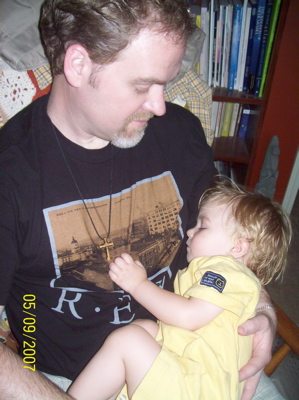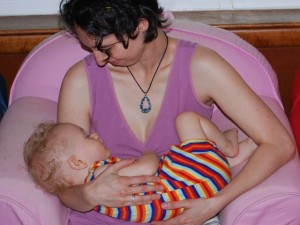Samantha Gray shared her thoughts for this special Father’s Day post…

I hope the dads in your life have a very Happy Father’s Day! Fatherhood continues to grow in its standards and demands as it is more and more recognized for its important role in the development of children. Being a father is not easy, yet there is still very little that is actually accessible to men to support them in their role as fathers. In general, men are not the ones taking parenting classes, reading parenting books, chatting with friends and forming support groups.
It would seem easy enough to engage in these activities, even with bookstore shelves filled with books on fatherhood, but really the barriers to participating are high between work schedules, busy home lives, and the awkwardness of what is just not traditional. For many fathers the strategy seems to be to rely upon their spouse and perhaps, muddle through. But then that random connection occurs…
“You’ll never guess what happened at my meeting today. One of the ministers there told me their family co-sleeps! You would love to meet his wife, they practice attachment parenting too,” my own husband, Dan, continues excitedly, never giving me a chance to guess. He’s thrilled to find a kindred spirit, and so was the dad he met. Too bad the AP dad friend lives so far away—they both would like to compare notes from the dad’s perspective on attachment parenting.
I once wondered how Dan would learn anything about being a father when I knew I had a lot to learn about being a mother, even with the advantage of caring for three younger siblings and years of sitting experience. Especially, how would he learn a way of parenting that was different from how we were both lovingly raised? Here I was reading the books, comparing notes with friends at play dates and on long telephone calls, going to LLL and later API meetings, and eventually facilitating parent education programs. I was pretty miffed wondering when he was going to get started with his self education.
 I have been the primary source of parenting information for my husband, and after some years of marriage and children, that works pretty well, though sometimes the responsibility feels great to me. For many of our peers, that is basically the arrangement. Don’t think for a moment Dan’s just along for the ride–he’s a former attorney, well educated in weighing all the facts, challenging ideas and making his own judgments.
I have been the primary source of parenting information for my husband, and after some years of marriage and children, that works pretty well, though sometimes the responsibility feels great to me. For many of our peers, that is basically the arrangement. Don’t think for a moment Dan’s just along for the ride–he’s a former attorney, well educated in weighing all the facts, challenging ideas and making his own judgments.
There’s still so much that I cannot help him with, though. While my husband and I really do share in our beliefs about birth, feeding an infant, responding with sensitivity, using nurturing touch, practicing nighttime parenting, providing consistent loving care, and positive discipline–our perspectives are different. How can they not be? When I’m giving birth or breastfeeding, he is definitely not. On a lighter side, his nurturing touch is tussling for hours with the kids. Mine is cuddling close for story time. I can compare notes about nice story books and toddler communication skills with friends; who does he compare notes with about good wrestling moves that crack the kids up and that they’ll never forget?
Exercising your demons, a 2007 Men’s Health article by Laurence Gonzalez* addresses this isolation men feel from their own childhood through fatherhood. How would a chatty support group work when, “… part of the cultural influence involves the way men are taught from early childhood to be strong, silent, independent, and resistant to suffering.”? We might be raising our boys to express themselves and be interdependent for the future generations but what about the examples, the fathers, who sons, daughters, and wives need right now?
Gonzalez’s article focuses on how men cope differently than women do. I was particularly interested in the relevance of men’s connectedness, or rather, lack of connectedness, and how it relates to fathering.
Male babies receive less of every type of nurturing, including speech, touch, and comfort when they cry. And that is only the beginning of what will be, to one degree or another, a brutal upbringing for boys.
In the 1960s, the crusading social psychologist Jeanne Block and her colleagues explored how differently parents treat boys and girls. For instance, moms and dads encourage boys to be competitive and to achieve. They don’t like them to show their emotions. They encourage them to be less dependent; mothers push them away. They punish them more than they punish girls. And they are unaware that they treat boys and girls differently.
Because of early socialization, women are better at relationships–with children, friends, and relatives. In general, women have more friends than men and are closer to those friends. This, of course, is the direct result of boys’ having independence forced on them early in life, when what they need is emotional and physical contact with others.
But fathers’ parenting training is limited to their own upbringing for the most part, because of this self-imposed and culturally-limiting social isolation. We know this lack of connectedness has terrible implications.
I am so grateful to LLL and API and my connections, my social networks, for the daily support I receive as a parent. I know the tremendous value of this network so how can I not want this for my husband? Before our third child was born I began inquiring about becoming API Leaders. My objective was and continues to be to provide a support group that is very dad friendly, an attempt at culture change by studying carefully what would remove the obstacles and motivate a dad to participate.
API Support Groups across the country can help meet a father’s social network need through regular meetings for couples, fathers and special meetings—at times and places that accommodate dad too.
Men are engaging in online social networks– just look at My Space and Facebook. They are just clicks away from connecting with support so you can only expect I’ll mention Attachment Parenting International’s Forum.
The API Forum does not just welcome fathers but needs fathers. We would love to have a few willing fathers help us moderate and give dads a space to talk. They can support each other with tips from non-violent communication to even engaging in healthy venting about the family bed, challenges they encounter related to primary attachment in the first year, and even the best babywearing product for them. The entire forum is open to fathers who need support or help through all the stages of child development.
I know the majority of readers of this post are women. What else can we mothers do? Perhaps there is an element of awareness we need to create too. We mothers must work harder at seeing some issues from the father’s perspective, since mothers may continue to have the primary family task of bringing parenting information into the home.
Parenting education can also help break the cycle of disconnection but it is also not traditionally the domain of men. API’s new parent education program has an opportunity to clear a new path and connect fathers to information and to each other, and ultimately to their children, not just through a one-shot session but ongoing.
For full disclosure, my AP husband has now over the years read many, many books about the development of children, particularly the adolescent years, including Reviving Ophelia, Teenage Guys, and many others. In fact, he has been very much part of the solution, designing and carrying out a retreat for teenage boys about being a real man that is counter to the culture and providing much needed help to other parents. He’s the one who read and shared Laurence Gonzalez’s article with me.
Dan Gray is Camille, Luke, and Zaiah’s dad and the Coordinator of Youth Ministries for the Holston Conference of the United Methodist Church. Happy Father’s Day to the most wonderful husband and father! Love, Samantha, Camille, Luke and Zaiah.
* Quotes used with permission. Laurence Gonzalez is the author of Deep Survival: Who Lives, Who Dies, and Why (www.deepsurvival.com) and the forthcoming (in September) Everyday Survival: Why Smart People Do Stupid Things (www.everydaysurvival.net).
 Is it just me or is our society ridiculously quick to expect moms and babies to separate? It seems to me that our cultural norm dictates that mothers need “alone time” that can only be meaningful if they do not have a baby or small child along. In my experience with mainstream culture, even “mom type events” as a rule are expected to be child free. We moved to a new city when my oldest was ten months old and I reached out to many different groups looking for companionship (Moms and More, Mom’s Book Club, Moms group through my husband’s residency…) and over and over the expectation and the norm was that moms and babies would be separated. Awful!
Is it just me or is our society ridiculously quick to expect moms and babies to separate? It seems to me that our cultural norm dictates that mothers need “alone time” that can only be meaningful if they do not have a baby or small child along. In my experience with mainstream culture, even “mom type events” as a rule are expected to be child free. We moved to a new city when my oldest was ten months old and I reached out to many different groups looking for companionship (Moms and More, Mom’s Book Club, Moms group through my husband’s residency…) and over and over the expectation and the norm was that moms and babies would be separated. Awful!

 I have been the primary source of parenting information for my husband, and after some years of marriage and children, that works pretty well, though sometimes the responsibility feels great to me. For many of our peers, that is basically the arrangement. Don’t think for a moment Dan’s just along for the ride–he’s a former attorney, well educated in weighing all the facts, challenging ideas and making his own judgments.
I have been the primary source of parenting information for my husband, and after some years of marriage and children, that works pretty well, though sometimes the responsibility feels great to me. For many of our peers, that is basically the arrangement. Don’t think for a moment Dan’s just along for the ride–he’s a former attorney, well educated in weighing all the facts, challenging ideas and making his own judgments.